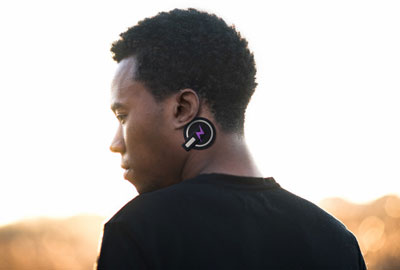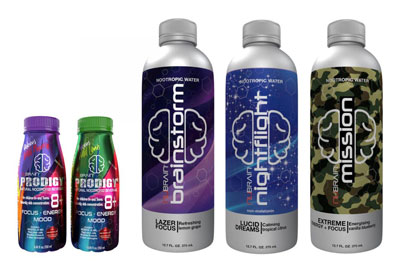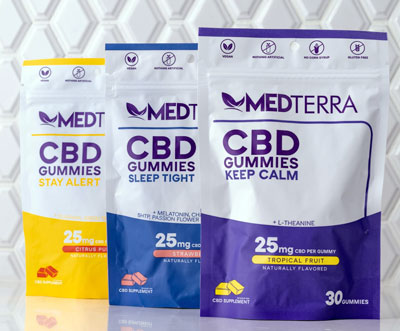Zing Patch, Nubrain Water, Stay Alert Gummy: Alternatives To Caffeine In Energy Booster Space
Executive Summary
Thync Global’s Zing Energy neurostimulation patch and Tesla Nootropics’ Nubrain Brainstorm caffeine-free water are promoted as alternatives to caffeine and energy drinks. They join a market dominated by big brands but with competition growing from products that boost energy without caffeine and sugar.
Patches, waters and gummies are being promoted as alternatives to the high-sugar and caffeinated beverages that dominate the energy-boosting market but increasingly face competition from products catering to health-conscious consumers.
Among the new products is Thync Global Inc.’s Zing Energy, the first disposable neurostimulation patch for alertness and energy.
The two-use disposable caffeine- and chemical-free patch is placed behind the ear for five minutes to deliver proprietary electrical impulses that are shown in company research to increase energy and alertness for up to four hours, said the company in a 19 May release.
“With up to 97% of Americans reporting at least one of the leading risk factors for fatigue and a further 76% reporting productivity-zapping fatigue on most days, Zing Energy offers a chemical and caffeine-free alternative to energy drinks,” says the Los Gatos, CA, company.
 Zing disposable caffeine- and chemical-free energy patch is placed behind the ear.
Zing disposable caffeine- and chemical-free energy patch is placed behind the ear.
Zing Energy was developed from in years of research funded by more than $30m from venture and individual investors, notes Thync. It says it has more than 20 patents in neurostimulation and applications the core technology.
To use Zing, pull a tab from the patch to active and place it behind the firm muscle behind the ear; a second use is accessible by peeling away the used gel layer and reapplying the patch for another five-minute activation.
The electrical stimulation from the patch impacts nerve branches located behind the ear, which enhances sympathetic nervous system activity, the company claims. The patch is recommended for daily use but not more than twice in a day.
Zing is not nearly the intensity of transcutaneous electrical nerve stimulation (TENS) patch technology used to alleviate pain by reducing pain signals going to the spinal cord and brain. TENS devices usually operate at three to six times the intensity of Zing patches, Thync says.
A single patch is available in two stimulation levels that retail at $6.99 each. Launching initially online, the company hopes to bring the product to convenience and additional online retailers.
Tesla Nootropics And Medterra Gummies
Tesla Nootropics Inc. is launching Nubrain Brainstorm, a caffeine-free nootropic water with substances known for promoting energy, focus and mental stamina, the company claims.
 Nubrain Brainstorm is a caffeine-free blend of eight cognitive-enhancing natural and herbal nootropic ingredients.
Nubrain Brainstorm is a caffeine-free blend of eight cognitive-enhancing natural and herbal nootropic ingredients.
Promoted as an alternative to energy drinks and coffee, the formulation is a blend of eight cognitive-enhancing natural and herbal nootropic ingredients including guarana seed, American ginseng and ginkgo biloba extracts and L-arginine base.
“The combination of the natural yet powerful ingredients bring an immediate sensation and you can feel an alertness within 15 minutes,” the Dover, DE, firm says. “You will be able to focus more, have less brain fog, feel motivation and have an appetite to get things done.”
Tesla Nootropics says the product is hitting the market as functional ingredients are leading the natural products industry and many health-conscious consumers are rethinking their use of caffeine.
“We feel that the energy drink market has had it’s turn and it is now time for the next generation of drinks. Drinks that help the brain and support people achieve more every day,” says co-founder Angela Kahn.
The firm says Brainstorm is the flagship in a four-product line that also includes a higher-level energy formula with similar ingredients, Nubrain Mission, Nubrain Nightflight to promote lucid dreaming and quality sleep and Nubrain Prodigy, the first nootropic drink available for kids. The 12.7-ounce drinks retail for $19.99.
CBD marketers are also getting into the energy arena. Medterra CBD Inc. recently expanded its line of CBD gummy products with Stay Alert Gummy, a citrus punch flavor that pairs 25 mg cannabinoid with ginkgo biloba, guarana and green tea extract to improve focus and increase brain energy, the company says.
 Stay Alert Gummy in citrus punch flavor pairs 25 mg CBD with ginkgo biloba, guarana and green tea extract.
Stay Alert Gummy in citrus punch flavor pairs 25 mg CBD with ginkgo biloba, guarana and green tea extract.
“So long, caffeine jitters. Hello, crystal-clear thoughts,” the Irvine, CA-based company says.
The vegan gummies, formulated without artificial flavors and high fructose corn syrup, are available online in 30-count packages for $39.99 and will availability in retailers is expected soon, the firm says.
The US energy drink market was valued at $3.4bn in 2019, according to a January report by market research firm Statista.
The market is led by Red Bull and Monster brands, both offering sugar-free versions that are among the top sellers. According to Statista, Regular Monster Energy drinks lead the segment with 24.9% share, followed by Monster Energy (15.1%), Red Bull Sugar Free (6.7%) and Monster Energy Zero (5.9%), with smaller brands accounting for the remainder.
Although energy drinks are one of the fastest-growing non-alcoholic ready-to-drink US beverage categories with sales increasing around 5% annually, household penetration has slowed as consumers grow increasingly concerned about unknown ingredients in products.
A recent report by Grandview market research found increasing concerns among consumers about the health impacts of high caffeine in drinks, including sleeplessness and abnormal heart rhythms are expected to restrain the growth of traditional energy drinks moving forward.
Nonetheless, major beverage consumer products firms are looking to enter the space; in October, Coca-Cola announced it was launching a four-product energy drink in the US in January that tastes like Coke Classic. The range included two zero-calorie options. (Also see "Coca-Cola Takes 'Things Go Better With Coke' Approach To Energy Drink Market " - HBW Insight, 23 Oct, 2019.)
